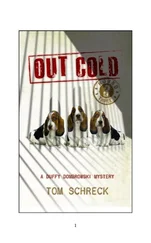Certainly Thorvall's gifts to Thor seemed to be remarkably effective. No one was seasick except for Gudrid, whose servants looked after her as she vomited, and it was on the morning of the ninth day after leaving Brattahlid that Thorvall gave a deep sniff and said firmly, 'Land.' By evening we could smell it too, the unmistakable scent of trees wafting to us from the west. On the morning of the tenth day we saw on the horizon the thin flat smudge that was the edge of Vinland, and twenty-four hours later we were close enough for Tyrkir and Thorvall and the other veterans to establish our exact position. With the help of Thorvall's wooden disc our knorr had made a near-perfect landfall. By general opinion we were only a day's sail from the place where we would find Leif s cabins.
The land was vast. The coastline extended across our ship's bow, as though the country would go on for ever in each direction. Behind the coast, in the interior, I could see the dark green swell of an immense forest, where the land rose in a succession of low hills as far as the eye could see. The shore itself was one low, grey headland after the another, divided by deep bays and inlets. Occasionally there were beaches of sand, but for the most part the foreshore was a jumble of sea-worn rocks, where the waves rumbled and surged. The colours of the stones were drab except where a crust of seaweed and lichens added touches of green and brown. To anyone from more southerly climates, the shore of Vinland would have looked like a bleak and forbidding place. But we had come from barren Greenland and, before that, from Iceland with its equally harsh landscape. Vinland showed great potential to the farmers among us. They noted the early growth of wild meadow-grass speckling the land behind the beach and the first flush of shoots on the low bushes of willow and alder. The bull and three cows on board also sensed the pasture and became restless to get ashore. We kept a sharp lookout for signs of
Skraelings and Tyrkir probably kept an eye open for his mysterious unipeds. But nothing moved. The land seemed empty.
Neverthless Karlsefni was cautious. He remembered Thorstein's death at the hands of the Skraelings and summoned our two 'wild Scots', Haki and Hekja. He told them that he was going to put them ashore so they could make a wide sweep inland. If they encountered Skraelings, they were to avoid contact, stay hidden, and try to assess the numbers of these strange people. After three days the two scouts were to report back to the beach, where our vessel would be anchored close by. Haki and Hekja each filled a satchel with dried food, but took nothing else. They were both wearing their usual dress, nothing more than a coarse blanket with a slit through which to put the head. There was a hood for when it rained, but otherwise the garment was so basic that it was open at the sides except for a single loop to fasten the cloth between the legs. Underneath they were naked. Both scouts clambered down into our small tender, and Thorvall and a small crew rowed them to the beach. There the Scots slipped into the water and waded to land before walking up the beach and disappearing into the scrub. Apart from a knife, they carried no weapon or tool, not even a steel and flint for making fire. 'If the Skraelings catch them, they'll think we've come from a tribe more wretched than themselves,' someone said as we backed our oars and manoeuvred the knorr to a safe distance, well out of arrow range.
Those three days seemed like an eternity for an eight-year-old boy. Karlsefni flatly refused to let anyone go ashore. We had to sit on the knorr, impatiently watching the run of the tide, trying to catch fish but without much success, and looking for signs of movement on land and seeing nothing until, suddenly, the slim figures of the two runners reappeared. Thorvall and a couple of the men went in the scouting boat to pick them up, and the two Scots returned with encouraging news. They had seen no Skraelings, they said, nor any sign of them.
We arrived at Leif s cabins at noon on the second day of coasting, but did not go ashore until Thorvall and four of the men
had gone ahead, armed and alert, to check the abandoned huts, looking for strangers. But they found no sign that anyone had been there since the unlucky expedition two years earlier. Our scouts waved to us to bring the knorr into the anchorage, and by nightfall the entire expedition was safely ashore and setting up the wadmal tents which would be our homes until we had refurbished the semi-derelict cabins.
Three winters of rain and wind and snow had beaten on the turf and stone walls of Leif s cabins until they were slumped and crumbled. The rafters had fallen in. Weeds and wild grass grew on the floors. The original cabins had been constructed only for short-term occupation, so they had been roofed over with wadmal to keep out the weather. Now that we were here to stay, we needed something much more sturdy and permanent. So we began to mend and enlarge the cabins, build a big new longhouse, clear the land for our cattle, dig latrines. Our knorr, which had appeared to be so amply laden when we started out, now seemed to be a meagre source of supplies. The cattle had taken up most of the available cargo capacity, and Karlsefni had brought tools for the future, not food for the present. So we nearly starved during that first month. Of course there was no question that we would kill and eat the cattle. They were the beginning of our herd, or so we hoped. We had no time to investigate the fishing or check the forest to see if there was any wild game. Instead we laboured from dawn to dusk to cut and carry and stack hundreds of turf blocks for the main walls of our new longhouse. Soon people began to complain of hunger and how they needed proper food, not thin watery porridge, if they were to work so hard. The Christians among us began to pray to their God, seeking his help to alleviate their distress. They set up their cross-shaped symbol at one edge of the settlement, and when Thorvall — rather provocatively, I thought — built a little canopied shelter on the opposite edge of the settlement and made a pile of stones under it as his altar to Thor, there was very nearly a fight. The Christians accused him of being poetry from its guardian Suttung. More important, my growing devotion to Odinn was in harmony with my natural wanderlust. Whenever I have set out on any journey I have done so in the knowledge that the All-Father is the greatest of all far-farers, and that he is watching over me. In that regard, he never played me false, for I have survived when many of my travelling companions fell.
TYRKIR ALSO TAUGHT me the details of the mysterious prophecy which Gudrid had mentioned on that dismal day in Lyusfjord when she sat beside Thorstein's deathbed, and I had let slip that I had seen the fetches of the not-yet-dead. Tyrkir had been delayed late in his workshop, where he made and repaired the metal tools essential to our farming. Gudrid had sent me to take the little German his supper. 'She's a good woman, your foster mother,' Tykir said as he set aside the empty bowl and licked his fingers. 'Far too good to fall under the influence of those crazy White Christ fanatics. No one else can sing the warlock's songs so well.'
'What do you mean, the warlock's songs?' I asked. 'What are they?'
Tyrkir looked at me from under his bulging forehead, a momentary gleam of suspicion in his eyes. 'You mean to say that your foster mother hasn't told you about her and the Little Sibyl?'
'No, I've never even heard of the Little Sibyl. Who was she?'
'The old woman Thorbjorg. She was the Little Sibyl, the volva. She died four years ago, so you really never knew her. But plenty still do, and they all remember the night when Gudrid Thorbjornsdottir revealed herself.'
Tyrkir settled himself on the low stool near his anvil, and pointed for me to make myself comfortable on a pile of sacks that had held charcoal for his simple furnace. It was obvious that his story would be a long one, but he considered it important that I know the details about my foster mother. Anything which concerned my adored Gudrid was important to me, and I listened
Читать дальше








